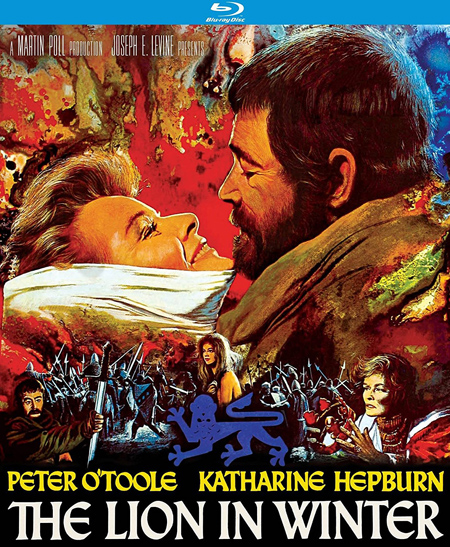
“WHAT FAMILY DOESN’T
HAVE ITS UPS AND DOWNS?â€
By Raymond Benson
One
of the gems of 1968 was The Lion in
Winter, a multi-nominee for the Oscars (including Best Picture and
Director), and one of the better period costume dramas that seemed to be so
popular in the 60s. Capitalizing on the success of Becket and A Man for All
Seasons, Winter is based on a stage play by James Goldman, who also wrote
the screenplay and won an Oscar for it.
While
the picture is a handsome production, its primary asset is the acting. What a
cast, and what performances! Katharine Hepburn, as Eleanor of Aquitaine, picked
up the Best Actress trophy (although that year there was a tie—she shared the
award with Barbra Streisand in Funny Girl).
Peter O’Toole stars as Henry II for the second time (he played a younger
version of the man in Becket, four
years earlier), and received a nomination for Best Actor. For my money, this is
the performance out of many nominations for which he should have won—he
dominates the movie with a commanding, almost-mad presence. Interestingly, the
actor was only 36 when the film was made, and he plays a Henry who is in his
fifties. On the other hand, Hepburn was 61 when she made the picture, and she
plays a 45-year-old Eleanor. The miracle is that one doesn’t notice either
actor’s true age.
Also
rounding out the cast are Henry’s three sons, played by a young Anthony Hopkins
(as Richard the Lionheart), John Castle (as Geoffrey), and Nigel Terry (as
John, who later became King John). While all three are terrific, and it’s
especially enlightening to examine Hopkins’ performance and compare it to his
later more renowned work, the real revelation in the picture is the appearance
of a very young Timothy Dalton as
King Philip II of France. Dalton is outstanding
in a small but pivotal role upon which the plot hinges.
The
year is 1182. Henry II decides to hold a Christmas party at the castle, so he
lets his wife Eleanor out of prison (!) so she can attend along with their
three surviving sons (the others are long dead) and Henry’s young mistress,
Alais (Jane Merrow). Eleanor has long accepted with grace and humor that Henry
beds other women and that their marriage is over—although throughout the course
of the story it is apparent that there are deep wounds in her heart. All three
sons are vying for the throne since Henry, being in his fifties, is on his way
to the grave—although one wouldn’t know it from the energy he displays. Henry’s
favorite is young John, who is a bit of a bumpkin. Eleanor prefers Richard.
Geoffrey prefers himself. Oddly, whoever is chosen gets Alais!
In
short, The Lion in Winter is the
story of a dysfunctional family. Eleanor wryly delivers the line that is the
title of this review at a key moment after the men attempt to kill each other.
In fact, the script is full of great lines. Henry: “What shall we hang?—the
holly, or each other?†Eleanor: “In a world where carpenters get resurrected,
everything is possible.†Eleanor (to one of her sons): “Hush dear, mother’s
fighting.â€
Kino
Lorber’s newly restored 4K Blu-ray looks marvelous, and the sound is excellent.
It shows off John Barry’s Oscar-winning score (play it loud!) and includes an
audio commentary by the late director Anthony Harvey. There is a supplemental
interview with sound recordist Simon Kaye, which is fine, but one wishes there
could have been interviews with some of the surviving stars such as Hopkins and
Dalton. The theatrical trailer and other Kino Lorber title trailers are also
included.
The Lion in Winter is a top-notch
exercise in superlative acting and grand writing. It is prestige cinema at its
finest. Don’t miss it.
CLICK HERE TO ORDER FROM AMAZON
(Actress Jane Merrow discusses the film in an exclusive interview in Cinema Retro #41, coming in May.)